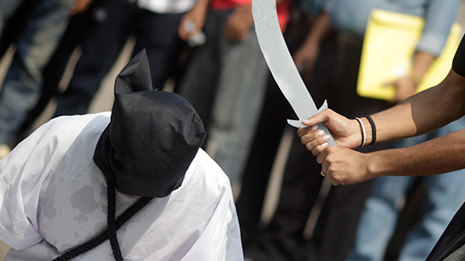READ MORE: S. Arabia beheads over 80 people in 2014, highest level in five years
A security officer was detained by the country’s police in the city of Mecca for filming the beheading on his mobile phone. He was among the staff who were involved in execution, reported Okaz, an Arabic Saudi Arabian daily newspaper.
Police haven’t yet released the identity of the suspect. The man will face charges in military and Sharia courts.
The woman, Laila Bint Abdul Muttalib Basim, from Myanmar, was executed last Monday after the authorities found her guilty of torturing and murdering her seven-year-old stepdaughter. Her death sentence was ratified by a royal order.
The beheading, which took place in the streets of Mecca, was recorded on a mobile phone and uploaded onto social networks.
The video caused uproar among human rights groups, who urged the authorities to take action.
The National Society for Human Rights (NSHR), a Saudi Arabian human rights organization funded by the Saudi government, said the author of the video should be punished.
According to NSHR member Mohammad Al Sahli, the country’s legislation allows the family of the executed woman to take legal action against those who caused them harm through the filming, or the dissemination, of the video.
“Those who disseminated the clip are not less guilty than those who filmed the execution,” he said.
READ MORE: Saudi Shia leader sentenced to death for role in anti-govt protests
However, another blogger, Abu Tariq, said that “the wide dissemination of the clip is a positive thing.”
“Any person tempted to torture children will think twice after watching the execution video. Domestic violence is unfortunately turning into a phenomenon,” he added.
However, not everyone agreed with the National Society for Human Rights on how the authorities should punish the suspect and if they should do it after all.
“There is no reason to take any action against those who filmed or spread the clip,” said a blogger using the name Mifaq. “The purpose of the public execution is to deter people and using videos will help such a message reach the largest number of people.”
Saudi Arabia executed more than 80 people in 2014, a toll that brought the number of publicly announced executions to its highest level in five years, according to AP tally released in January.
Rape, murder, armed robbery, drug trafficking, sodomy, practicing witchcraft and renunciation of one’s faith are all capital offenses in the ultra-conservative absolute monarchy, which has a legal system based on Islamic, or Sharia, law rather than legal codes and precedents.
According to Amnesty International data, Riyadh has one of the highest execution rates in the world: 79 executions in Saudi Arabia in 2013 and 2012, and 82 in 2011 and 2010.
More about:
















































